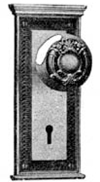

In 1999, the U.S. Small Business Administration and the Department of Justice teamed up to provide a guide for small businesses, helping them comply with the requirements of the Americans with Disabilities Act (ADA). Among the suggestions is a subsection dealing with “architectural barriers”—“physical features that limit or prevent people with disabilities from obtaining the goods or services that are offered.” Of specific note are round doorknobs, as they may be difficult for some people to grip and turn, thereby preventing access to whatever’s on the other side. In late 2013, Vancouver (Canada) echoed its neighbors to the south and banned round knobs on doors on any new housing built within its borders. If you want to respect those who are differently abled, you may want to go with lever-like handles instead. As Popular Science argued, they’re “the way of the future.”
Just don’t tell that to the people of Aspen, Colorado. Because in many parts of that area, not only are round doorknobs allowed; they’re required by law.
The reason? Bears.
Aspen is the largest town in Pitkin County, with just under 9,000 full-time residents. That constitutes roughly half of the county’s population—but only if you count people. Due to the large amount of forest in the area, Pitkin County is also home to 5,000–10,000 black bears.
The bears eat about 20,000 calories a day during the summer and autumn months as they prepare for hibernation, and when it comes to a meal, they’re not all that picky. Often, a bear will wander into town in search of food, and let’s face it, we humans do a great job of leaving snacks out. Unsecured garbage cans, uncleaned barbecues, and birdfeeders are specifically mentioned by the Aspen authorities as open invitations to a foraging bear. In fact, from April 15 to November 15—that’s bear season—a city ordinance specifically prohibits residents from using birdfeeders.
As of the summer of 2010, doorknobs also fell under a bearcontrol ordinance. There were a few instances of bears entering people’s homes and businesses, not understanding that it was inappropriate to do so; bears shouldn’t be expected to know that breaking and entering is both illegal and impolite. Levers, as the ADA compliance guide notes, are easier to open for people who can’t grip and turn things. Bears lack opposable thumbs and, therefore, find levers much easier to open than they do the classic doorknob. So the Pitkin County government, as the Sky-Hi News reported, passed a law that “requires solid, round-handled doorknobs rather than the lever variety on exterior doors on all new homes” in the areas near bear habitats.
The rule had its skeptics and dissenters, of course. Some saw it as governmental overreach, while others pointed out that the bears could often flatten the knobs or just smash down doors. (They’re bears, after all.) But don’t worry about any issues regarding ADA compliance. The Sky-Hi News assures that “exemptions are made for doors that must meet disability standards.”
Ever notice that many doorknobs are made of brass or copper? There’s a reason for that. Those types of metals are poisonous to many types of household germs (although we don’t yet have a good explanation as to why), and doorknobs made of those materials disinfect themselves slowly over the course of about eight hours.